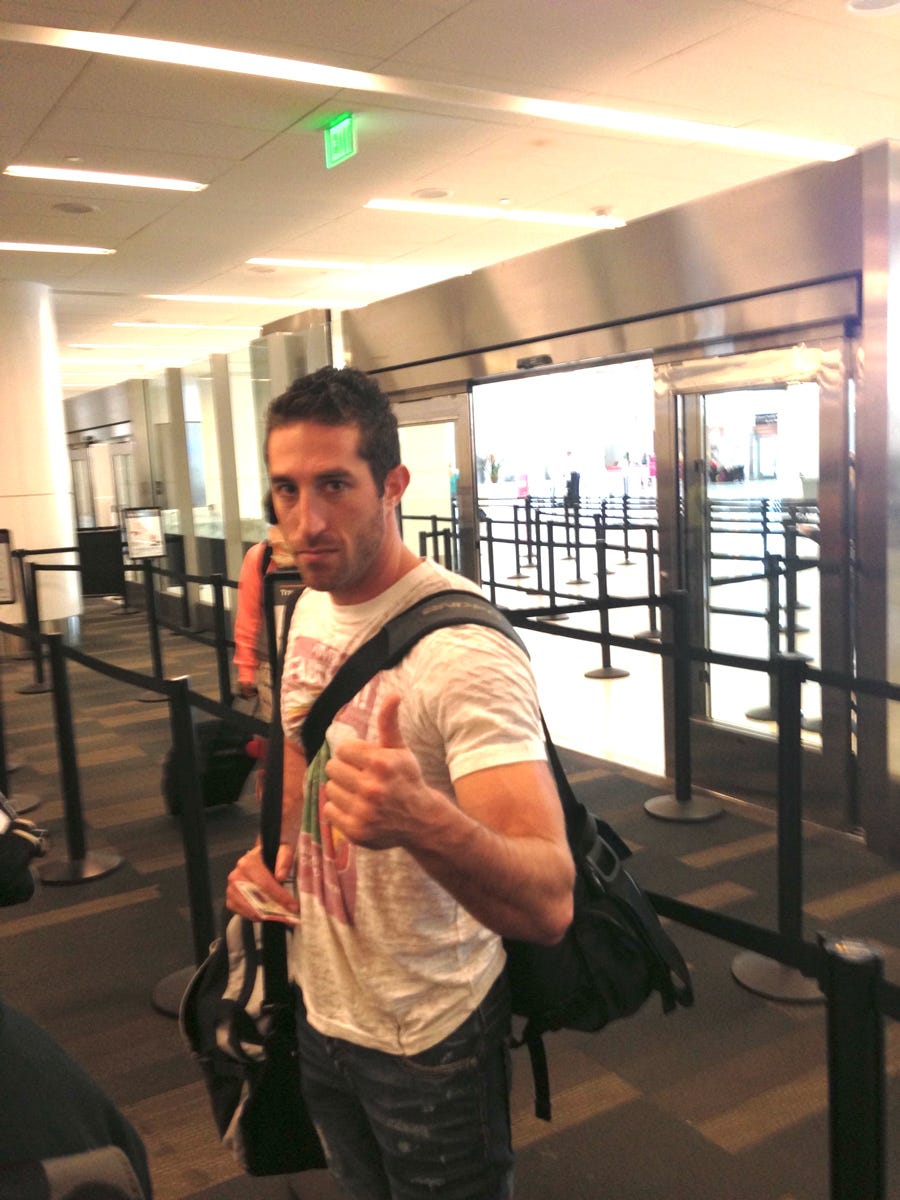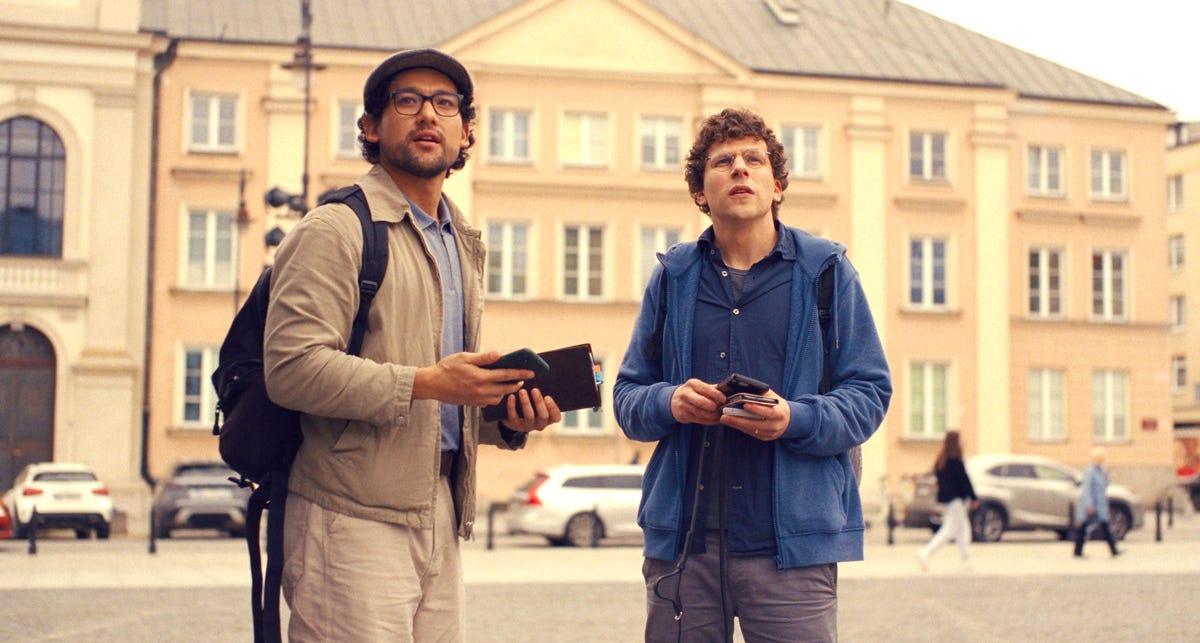'A Real Pain' Understands What So Many Travel Narratives Get Wrong
Give Kieran Culkin his flowers, and save a few for Jesse Eisenberg. 'A Real Pain' is a real delight.
Welcome to The #Content Report, a newsletter by Vince Mancini. I’ve been writing about movies, culture, and food since I started FilmDrunk in 2007. Now I’m delivering it straight to you, with none of the autoplay videos, takeover ads, or chumboxes of the ad-ruined internet. Support my work and help me bring back the cool internet by subscribing, sharing, commenting, and keeping it real.
—
Countless memoirs have explored the way travel can, in the words of Hansel from Zoolander, “change your whole perspective on shit.”
A few of those books have been made into films, with varying levels of success (Reese Witherspoon got the Oscar nomination for Wild that Julia Roberts was probably hoping for when the latter made Eat Pray Love). For the most part though, Lost in Translation stands out as one of the few great movies to explore the way travel can create a sort of alternate version of a person, more free from the inertia of everyday life and suddenly capable of the kind of character growth that’s impossible within the boundaries of a normal routine. (White Lotus, especially season one, also does this wonderfully, if we can include television shows).
We can now add A Real Pain to the list. Jesse Eisenberg’s feature directorial and original screenwriting debut is simultaneously a great travel movie, the beau ideal of a tight 90, and the perfect showcase for Kieren Culkin being the obnoxious little shit with a heart of gold we love to watch (Eisenberg previously adapted the screenplay for When You Finish Saving the World from Audible original — I did not like that one). It’s easily Eisenberg’s best work as a creator and Culkin’s best work work as an actor, and more importantly, just a joy to watch: a movie that explores the full range of human emotions without boring you to tears and dances nimbly between light and dark without ever feeling like it’s stretching for relevance.
Eisenberg and Culkin play David and Benji Kaplan, the neurotic Jew and the new agey Jew, respectively, two cousins who are getting together for a big trip: a tour of Jewish historical sites in Poland, with a side trip to their grandmother’s hometown in honor of her passing. In a lot of ways, this scenario writes itself, simply transposing a familiar odd couple dynamic (devil-may-care Benji helps anal retentive David loosen up, David helps Benji keep it together) to a travelogue of Poland. Only, for one thing, I haven’t seen too many other movies set in a group tour of Poland, and for another, Culkin’s character is so unique that he transcends any tropes of the goofy stoner or the Odd Couple Oscar. He’s so much more than that, and it’s a credit to Eisenberg that his screenplay never tries to box Benji in or explain away the elements that make him special.
I have a close friend of my own that I lost a few years back, whose name also happened to be “Benji Kaplan,” who was also a travel junkie with an eclectic fashion sense, and also had a brother named David. I’ll admit there was some added emotional punch to watching a character with the same name show up in outfits that sometimes looked as if the costume designer had raided his closets. Even absent the personal hook, A Real Pain is mostly Culkin’s show, and he does the most with it. Benji has a lack of tact that occasional grates on everyone around him, but especially on his cousin, who feels the burden of having to be Benji’s ambassador to the world. That Benji’s sins so clearly come from a place of vulnerability means people tend to forgive him his worst faux pas(es?), and some of his tossed off observations about them end up being deeply insightful.
Just as in White Lotus, one of the best parts of any travel story is the people you meet along the way. The Kaplans’ odd couple dynamic might not be particularly new, but the question of who might one meet on an English language tour of historical Jewish sites in contemporary Poland is all fresh and fertile territory. Those other characters include sad-but-bougie divorcée Marcia (Jennifer Grey — yes, that Jenner Grey), comfortably basic middle aged couple Mark and Diane (Daniel Oreskes and Lisa Sadovy), and the Rwandan Jewish convert Eloge (Kurt Egyiawan), all being guided on their tour by Oxford history graduate James (Will Sharpe), who can know virtually everything there is to know about Jewish history, but never tap into the defining epigenetic pathos of the people (or something like that, the Oxford phD himself probably would’ve put it better).
The sensitive(and-British)-to-a-fault James, incapable of not taking all of Benji’s churlish criticisms to heart, is a perfect character for Will Sharpe. Sharpe, an actual former Cambridge scholar doing what I assume is closer to his natural accent, proves here that him being the worst part of White Lotus season 2 was more the fault of the writing than his acting. Whatever the case, he’s miles more enjoyable playing a dowdy English academic than he was playing a predictable American tech bro. (It’s also possible that guys who work in tech are just as uninteresting in fiction as they are in life).
Benji, meanwhile, seems to be able to see into all of their souls while being utterly incapable of reading the room at the same time, forever altering their sense of self with casual remarks he won’t even remember himself the next day. Eloge speaks eloquently about finding meaning in Jewish ritual (which interests the secular atheist Benji not at all, exactly the way it would’ve gone over with my Benji*). James attempts universal alterations to his tour over Benji’s bespoke criticisms. Meanwhile, the unemployed, mostly directionless Benji sparks up an unconventional relationship with hyper image-conscious career woman Marcia, solely because they’re both, at this particular life moment, filled with a symbiotic brand of melancholy.
Those are the types of relationships that make travel narratives so compelling (see also, again, Lost in Translation). Characteristically, the two share the film’s most memorable exchanges. As Marcia complains about her overly-status conscious ex-husband, Benji groans, “Ugh, money is like heroin for boring people.”
MARCIA: “I don’t even know what that means, but…”
A Real Pain is a film about finding connection even as it wonders whether true connection is even possible. To that end, the setting is more than just an interesting backdrop. David and Benji are two characters who are forever bonded, despite their diametrically opposed approaches to life. They love each other for their shared history and hate each other for their contradictory values, and meanwhile wonder whether maybe the other one has had it right all along. What impulse is more human than that? And what better time to realize it than on an extended holiday?
Their shared sojourn to their grandmother’s birthplace is the perfect coda to the story: somehow both the proverbial “place where it all began” and in practice, a place utterly foreign and perfectly unknowable to them. Throughout it all, as the script reveals more and more of Benji’s story, I had the gnawing sense that Eisenberg’s script would bend over backwards trying to wrap everything up in a neat little bow — like so many of those typically treacly arthouse conventional Little Miss Sunshine clones have before it. Instead he lets it breathe, with an ending that opens up a world of possibility rather boxing itself into a tidy sense of closure. It’s true to the travel narrative, where the paths left unexplored are always so much more exciting than the ones that led us here.
Grade: A
*I was talking to another of Ben’s high school friends at his funeral (I knew Ben from college) who shared with me the story of how he was talking to Ben on his literal death bed. The friend was telling Ben how he was convinced that they would see each other again some day. Ben was equally adamant that, “Nah, man, I’m pretty sure this is it.” I tend to try to think like the friend, but Ben flat out refusing to compromise his long-held beliefs for even a single second until the very end is part of why I loved him so much.

—
As always, don’t forget to check out the podcast! We have new episodes of both the Frotcast and Mad Yourself A Man (including episode 105, with Laremy Legel).







Might have to go and listen to some old Frotcasts on my Thanksgiving drive (7 hours). Much love to Ben and the OG Frotcast crew (and the new-G Frotcast crew).
His Diary of a Uniballer book was excellent and has helped to influence my work with cancer patients. Whoop whoop